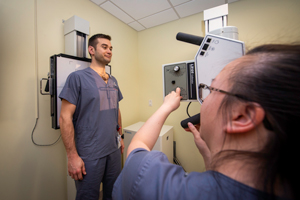How Do I Prepare to be a Radiographer?
Blizzard: February 24, 2026
Classes before noon on Tuesday, February 24 will remain remote. Review our website for detailed instruction.
Radiographers play an essential role in diagnosing patients. Highly trained in the technical administration of radiation and imaging equipment, these skilled patient care workers enjoy a range of job opportunities in a lucrative and rewarding field. So how can you join their ranks?
What kind of education do I need to be a radiologic technologist?
In Connecticut, you’ll require an Associate of Science degree in radiography, which typically takes about two to three years of part-time study to complete. For example, SHU’s program includes 62 credits.
Program coursework covers a range of topics in the radiologic sciences, including:
- Basic equipment operation
- Quality control
- Radiation protection
- X-ray circuits
- Digital imaging
- Specialized modality imaging
The best radiography tech programs focus on teaching core and critical skills, as well as providing comprehensive clinical practice through instruction, hands-on learning opportunities and real-world situations. At Sacred Heart, aspiring radiographers are taught through experiential learning, including practice with real-world radiation and imaging equipment and opportunities to critique images and arrive at effective solutions.
What are three qualities of a good radiographer?
Interpersonal skills
A radiographer deals with the public throughout the day and must show professionalism, warmth, compassion and patience to a wide range of people, including patients, staff and instructors. Proper judgment and respect for human dignity are also key attributes for a radiologic technologist.
Communication skills
Radiographers must use the appropriate vocabulary and language to convey essential information and concepts to patients and staff.
Problem-solving skills
Students must develop and practice effective problem-solving skills and critical thinking skills and be adept at manipulating technical factors for nonroutine examinations and trauma patients.
What does a typical day look like for a radiographer?
Radiographers have a range of job opportunities in acute, ambulatory, long-term health care settings and physicians’ offices, with patients of all ages and medical needs.
Typical daily tasks include:
- Performing diagnostic imaging procedures, such as CT and PET scans, MRIs and ultrasounds
- Interviewing patients and preparing electronic records and patient histories
- Reviewing information from procedures
- Communicating with physicians and patients about results
 How much does a radiography tech make?
How much does a radiography tech make?
According to the U.S. Bureau of Labor Statistics (BLS), the national average for radiologic technicians was $73,410 in May 2023. The 2025 Connecticut average was $90,588, according to ZipRecruiter.
What can I do with a radiography degree?
Radiography is a building block that allows you to use your skills in many different modalities within the field. You may choose to perform diagnostic imaging exams, such as X-rays or CT scans in various health facilities. You may go into areas such as preventative health screenings (such as bone density screenings), magnetic resonance imagining (MRI) or ultrasound.
A radiography tech program can also be a stepping-off point for additional learning. At Sacred Heart, you can seamlessly transition into our BS in Health Science program, with a focus on radiography through the College of Health Professions.
Why should I get my degree in radiography at Sacred Heart University?
 The associate degree in radiography at Sacred Heart University equips you with the foundational skills and knowledge for a career in radiography. Combining sciences with the humanities, our curriculum not only readies you for entry-level work in the medical field, but it also prepares you for lifelong learning.
The associate degree in radiography at Sacred Heart University equips you with the foundational skills and knowledge for a career in radiography. Combining sciences with the humanities, our curriculum not only readies you for entry-level work in the medical field, but it also prepares you for lifelong learning.
SHU has strong partnerships with several hospitals that offer our students clinical experiences across Fairfield and New Haven counties in Connecticut.
Think the radiography program at Sacred Heart University might be for you?
Curious about earning your associate degree in radiography? Talk to Noreen Morgenstern, assistant director of undergraduate admissions, at morgensternn@sacredheart.edu or schedule a visit today!
 How much does a radiography tech make?
How much does a radiography tech make?